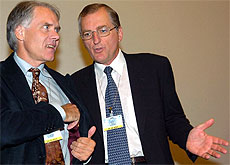Stockholm Convention to be based in Geneva

Geneva has been chosen as the new headquarters of the Stockholm Convention, which regulates the use and production of very hazardous chemical products.
Switzerland’s candidature was approved by the participating countries at the close of their conference in Uruguay on Friday. It comes after Rome withdrew from the running.
Delegates from 130 countries had convened in Punta del Este to discuss implementation of the convention covering 12 persistent organic pollutants (POPs) and to decide on a permanent headquarters.
The head of the Swiss delegation, Philippe Roch, said Geneva had been chosen unanimously after Rome withdrew.
The director of the Swiss environment agency said Switzerland’s contribution of SFr2 million ($1.66 million) made up almost half the convention’s yearly budget of SFr5 million. Switzerland had also funded the five-day conference which was estimated to have cost SFr1 million.
“The choice of Geneva is the fruit of Switzerland’s coherent and committed policy in the field of chemicals over many years in the UN forum,” commented Roch.
“The permanent location of the POPs secretariat in Geneva will lead to synergies with similar organisations in the city, and ultimately to more effective implementation of environmental policy.”
The opening of the new permanent secretariat confirmed Geneva’s reputation as the centre of expertise for chemical products and wastes, in its role as European headquarters of the United Nations Environment Programme’s chemical products division, the environment agency said in a statement.
“Dirty dozen”
The 12 POPs, which include dioxins and polychlorinated biphenyls (PCBs), are highly toxic for both humans and animals because they accumulate in the host organism.
The “dirty dozen”, as they are commonly known, can cause cancer and interfere with the reproductive functions.
The aim of the Stockholm Convention is to introduce a worldwide ban on the production and use of these pollutants and to limit emissions to a minimum.
The contracting parties can propose additional substances for inclusion in the convention. At the Uruguay conference a group of experts was set up to examine and evaluate applications from member states.
swissinfo with agencies
The 12 chemical products which are subject to the Convention on Persistent Organic Pollutants:
Aldrin, chlordane, DDT, dieldrin, endrin, heptachlor, mirex and toxaphene (insecticides)
hexachlorobenzene (fungicide)
dioxins and furans (by-products of industrial production and the incineration of waste)
PCBs (chlorinated hydrocarbons with industrial applications).
151 countries have signed the Stockholm Convention.
Switzerland ratified it in July 2003.
The convention came into force in 2004.

In compliance with the JTI standards
More: SWI swissinfo.ch certified by the Journalism Trust Initiative










You can find an overview of ongoing debates with our journalists here . Please join us!
If you want to start a conversation about a topic raised in this article or want to report factual errors, email us at english@swissinfo.ch.